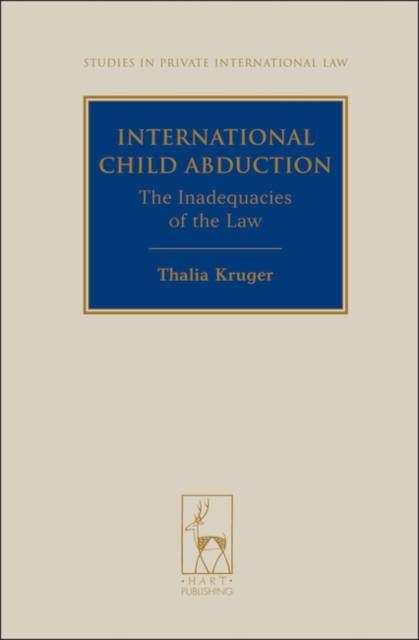
Bedankt voor het vertrouwen het afgelopen jaar! Om jou te bedanken bieden we GRATIS verzending (in België) aan op alles gedurende de hele maand januari.
- Afhalen na 1 uur in een winkel met voorraad
- Gratis thuislevering in België vanaf € 30
- Ruim aanbod met 7 miljoen producten
Bedankt voor het vertrouwen het afgelopen jaar! Om jou te bedanken bieden we GRATIS verzending (in België) aan op alles gedurende de hele maand januari.
- Afhalen na 1 uur in een winkel met voorraad
- Gratis thuislevering in België vanaf € 30
- Ruim aanbod met 7 miljoen producten
Zoeken
Omschrijving
International child abduction occurs when one parent wrongfully (i.e. in breach of the parental responsibility of the other parent) takes a child to a country other than that of the child's habitual residence, or wrongfully keeps a child in such a country. The author of this work was part of a research team that conducted a study, partially funded by the European Commission, to examine this problem in Belgium and Hungary, analyzing cases from 2007 and 2008 and interviewing the affected parents. This book is a revised version of the Belgian research report, which sets the problem of child abduction within its international context. It looks at the families in which abductions took place, how preparations were made for an abduction, the quest for the return of the child (including legal proceedings), and the aftermath of the abductions. Throughout the book, the results of the quantitative and qualitative data are explained. What emerges is that when a child is abducted, the solutions offered by the law are often inadequate. Family conflict is a complex societal issue, and child abduction is a severe form of family conflict. Rather than responding to child abduction with strict and contentious legal proceedings, the book argues that solutions based on respect, psychological assistance, and a search for consensus should be favored. (Series: Studies in Private International Law)
Specificaties
Betrokkenen
- Auteur(s):
- Uitgeverij:
Inhoud
- Aantal bladzijden:
- 292
- Taal:
- Engels
- Reeks:
- Reeksnummer:
- nr. 6
Eigenschappen
- Productcode (EAN):
- 9781849461566
- Verschijningsdatum:
- 3/08/2011
- Uitvoering:
- Hardcover
- Formaat:
- Genaaid
- Afmetingen:
- 160 mm x 234 mm
- Gewicht:
- 598 g

Alleen bij Standaard Boekhandel
+ 290 punten op je klantenkaart van Standaard Boekhandel
Beoordelingen
We publiceren alleen reviews die voldoen aan de voorwaarden voor reviews. Bekijk onze voorwaarden voor reviews.









